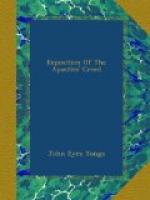The eighth article of the Creed declares belief in the third Divine Person—the Holy Ghost.
The words “I believe,” implied in every clause, are here repeated, to mark the transition from the Second to the Third Person of the Trinity.
While this doctrine underlies all the teaching of the Old Testament Scriptures, it was yet in a measure not understood or realised by the Jews, and as Christ came to make known the Father, so to Him we owe also the full revelation of the Holy Spirit. Prophets and Psalmists had glimpses of the doctrine, but they lived in the twilight, and saw through a glass darkly many truths now clearly made known.
While we speak freely of spiritual life, our conception of it is so vague that we are apt to overlook, or to regard lightly, the work of the Holy Spirit in redemption. The disciples of John, whom Paul met at Ephesus, believed in Jesus and had been baptized, and yet they told the Apostle that they had not so much as heard whether there was any Holy Ghost.[165] John tells us that even while Jesus was on earth the Holy Ghost was not yet given, because that Jesus was not yet glorified.[166]
That the Holy Ghost is a Person, and not, as some hold, a mere energy or influence proceeding from the Father, or from the Father and the Son, is apparent from the passages of Scripture which refer to Him. An energy has no existence independent of the agent, but this can not be maintained with reference to the Holy Ghost. He is associated as a Person with Persons. In the baptismal formula and in the apostolic benediction the Holy Spirit is spoken of in the same terms as the Father and the Son, and is therefore a Person as they are Persons. He is said to possess will and understanding. He is said to teach, to testify, to intercede, to search all things, to bestow and distribute spiritual gifts according to His will.
The Holy Ghost addresses the Father, and is therefore not the Father. He intercedes with the Father, and so is not a mere energy of the Father. Jesus promised to send the Spirit from the Father, but the Father could not be sent from or by Himself. It is said that the Spirit when He came would not speak of Himself—a statement that cannot apply to the Father; and while Christ promised to send the Spirit, He did not promise to send the Father.
The Holy Ghost is not the Son, for the Son says He will send Him. He is “another Comforter,” who speaks and acts as a person. The Holy Ghost said, “Separate me Barnabas and Saul for the work where-unto I have called them."[167]
The arguments for the distinct personality of the Holy Ghost prove also that He is God. The baptismal formula and the apostolic benediction assume His Divinity. The words of Christ with reference to the sin against the Holy Ghost imply that He is God, and Peter affirms this doctrine when, having accused Ananias of lying to the Holy Ghost, he adds, “Thou hast not lied unto men, but unto God."[168] Paul also asserts it




